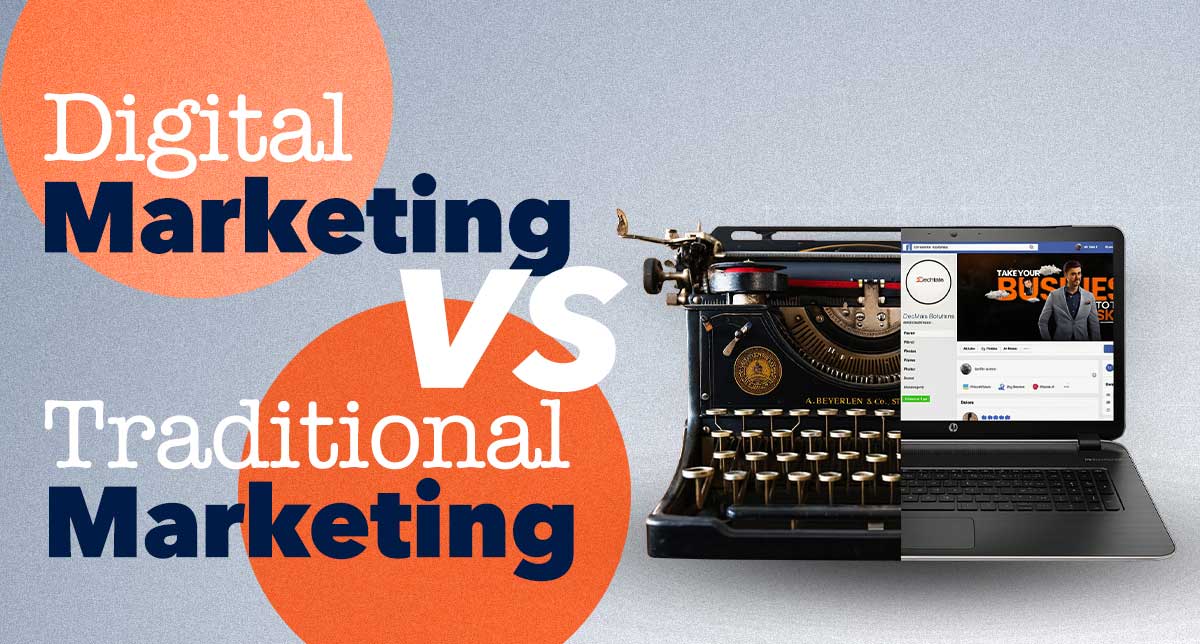In today's fast-paced world, digital marketing has become a cornerstone of business success. With the rapid rise of technology and the shift in consumer behavior, more businesses are opting to leverage digital strategies alongside traditional marketing methods. But with so many options available, it’s important to understand the core differences between digital marketing and traditional marketing, and more importantly, which strategy is more effective for your business goals.
In this article, we will compare digital marketing and traditional marketing across various aspects such as cost, audience reach, measurability, engagement, flexibility, and impact. This comparison will help you choose the most efficient and impactful approach for your business while providing practical solutions.



Cost Comparison
When it comes to cost, the difference between digital marketing and traditional marketing is immense. Traditional marketing methods such as TV ads, radio commercials, and billboards require large upfront costs. A TV commercial, for instance, can cost thousands, if not millions of dollars, depending on the network and time slot, and the audience you’re targeting is not always guaranteed. On the other hand, digital marketing offers businesses the ability to run effective campaigns at a fraction of the cost. Tools like Google Ads, Facebook ads, SEO (Search Engine Optimization), and social media marketing are all relatively affordable, with flexible pricing based on the business's needs and budget. A small business can start running ads with as little as $5 to $10 a day. Solution: For businesses looking to reduce marketing expenses, digital marketing offers an excellent opportunity. You can fine-tune your budget and target specific groups, ensuring that every dollar you spend reaches the right audience.
Audience Reach and Targeting
Audience reach is another area where digital marketing has a clear advantage. Traditional marketing typically uses broad, untargeted methods. TV ads, radio ads, and billboards are sent out to mass audiences, many of whom may not have an interest in the product or service being offered. In contrast, digital marketing allows for incredibly precise audience targeting. Platforms like Facebook, Instagram, Google, and LinkedIn allow businesses to target audiences based on factors such as age, gender, location, interests, behaviors, and more. This precise targeting ensures that businesses are reaching the most relevant individuals, increasing the likelihood of conversion. Solution: Digital marketing platforms offer detailed targeting features that allow businesses to reach their ideal customers with high precision. Utilize audience segmentation and remarketing strategies to get the most out of your budget. read more, what is digital marketingMeasurability and Analytics
One of the greatest advantages of digital marketing is its measurability. Traditional marketing often lacks clear metrics to measure the success of a campaign. For example, with TV or radio ads, it’s difficult to track how many people were reached or how many conversions resulted from the ad. With digital marketing, every action can be tracked. From the number of clicks on an ad to the conversion rate, and even how long people stay on your website, everything is measurable. Tools like Google Analytics, Facebook Insights, and email marketing platforms provide in-depth analytics that help you track and adjust your marketing efforts in real-time. Solution: By using analytics tools, businesses can track key performance indicators (KPIs) such as traffic, engagement, and ROI. This data helps in refining strategies and making informed decisions for future campaigns.Engagement and Interactivity
Engagement and interactivity are where digital marketing truly shines. With traditional marketing, there is little opportunity for immediate feedback or direct interaction with customers. While TV ads or print media can create awareness, they don’t allow customers to engage with the brand directly or immediately. Digital marketing offers multiple channels for real-time engagement. Through social media platforms, live chat, comments, and customer feedback, businesses can interact with customers directly. This interaction builds stronger relationships, improves customer loyalty, and provides valuable insights into customer preferences and pain points. Solution: Utilize social media platforms and live chat tools to engage with customers in real-time. Create interactive content such as polls, surveys, or Q&A sessions to further engage your audience.Speed and Flexibility
Another area where digital marketing outperforms traditional marketing is speed and flexibility. Traditional marketing campaigns take time to produce and deploy. Once you launch a billboard or a TV commercial, it often requires significant resources and time to make changes or updates. In digital marketing, you have the flexibility to adjust campaigns almost instantly. If an ad isn’t performing well, you can change the targeting, copy, or creative within minutes. Similarly, you can pause or stop campaigns if necessary, ensuring that your marketing budget is spent efficiently. Solution: Use real-time data to make quick adjustments to your campaigns. A/B testing and split testing also allow businesses to compare different versions of a campaign and optimize them for better performance.
Longevity and Impact
Traditional marketing typically has a limited lifespan. Once a billboard is taken down or a TV ad airs, its impact diminishes. It’s hard to maintain long-term brand awareness through traditional methods alone. On the other hand, digital marketing can have a long-lasting impact. Content such as blog posts, videos, and social media posts can continue to drive traffic and engagement for months or even years after they are published. This makes digital marketing an effective long-term strategy. Solution: Invest in creating evergreen content and optimize your SEO to ensure your digital marketing efforts have a lasting impact and keep generating value over time.To learn more about the benefits of digital marketing, we recommend reading the article on the advantages of digital marketing.
Conclusion
Choosing between digital marketing and traditional marketing depends on your business goals, target audience, and available resources. While traditional marketing still holds value in certain sectors, digital marketing provides clear advantages in terms of cost, targeting, measurability, and engagement. Businesses seeking faster results, better ROI, and long-term customer relationships should consider focusing more on digital channels. At HDM (High Definition Marketing), we specialize in crafting digital marketing strategies tailored to your business needs. Whether you’re looking to enhance your online presence, improve customer engagement, or drive conversions, we can help you implement the best digital marketing practices for sustainable growth. Tip: Embrace digital marketing to not only cut costs but also to engage your audience with measurable results and long-term impact. Reach out to us today at HDM Digital Marketing for a free consultation and learn how we can help grow your business.




